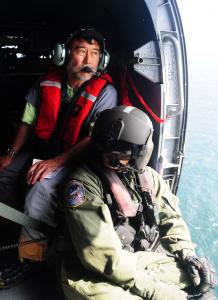Gary Shigenaka

NOAA Heritage Oral History Project
NOAA Heritage Oral History Project aims to document the history and legacy of NOAA through compelling interviews with its leaders. These firsthand accounts provide an invaluable resource that preserves NOAA's significant contributions to environmental research and management, fostering a deeper understanding of NOAA's vital role in shaping our understanding of the Earth's oceans and atmosphere.
Molly Graham
Gary Shigenaka is a third-generation Japanese American born and raised in Lake Forest, Illinois. During World War II, Gary's father, other relatives, and over 100,000 other Japanese Americans were forcibly relocated and incarcerated in internment camps. Following the war, Gary's father and mother moved to Chicago's suburbs, where Gary grew up. Gary studied oceanography at the University of Washington, graduating in 1976. He worked briefly as a field technician for what was at the time the Washington Department of Fisheries before becoming an observer aboard a Japanese crab factory ship operating in the Bering Sea. Gary then worked as a researcher and then crew member on the NOAA Fisheries ship, the Miller Freeman. He then returned to school, earning a master's degree from the University of Washington's School of Marine Affairs. Gary was awarded a Sea Grant Fellowship in Washington, DC, where he worked for one year on a nationwide coastal environmental monitoring program. Following the fellowship, Gary returned to Seattle and a position at NOAA that led him eventually to be deployed to the Exxon Valdez spill and involved in its cleanup and assessment for many years. Before retiring at the end of 2020, Gary continued to serve as a senior biologist on the Office of Response & Restoration's scientific support team.
Please Note: The oral histories in this collection are protected by copyright and have been created for educational, research and personal use as described by the Fair Use Doctrine in the U.S. Copyright law. Please reach out Voices@noaa.gov to let us know how these interviews are being used in your research, project, exhibit, etc. The Voices staff can help provide other useful resources related to your inquiry.
The NOAA mission is to understand and predict changes in climate, weather, oceans, and coasts, to share that knowledge and information with others, and to conserve and manage coastal and marine ecosystems and resources. The Voices Oral History Archives offers public access to a wide range of accounts, including historical materials that are products of their particular times, and may contain offensive language or negative stereotypes.
Voices Oral History Archives does not verify the accuracy of materials submitted to us. The opinions expressed in the interviews are those of the interviewee only. The interviews here have been made available to the public only after the interviewer has confirmed that they have obtained consent.
